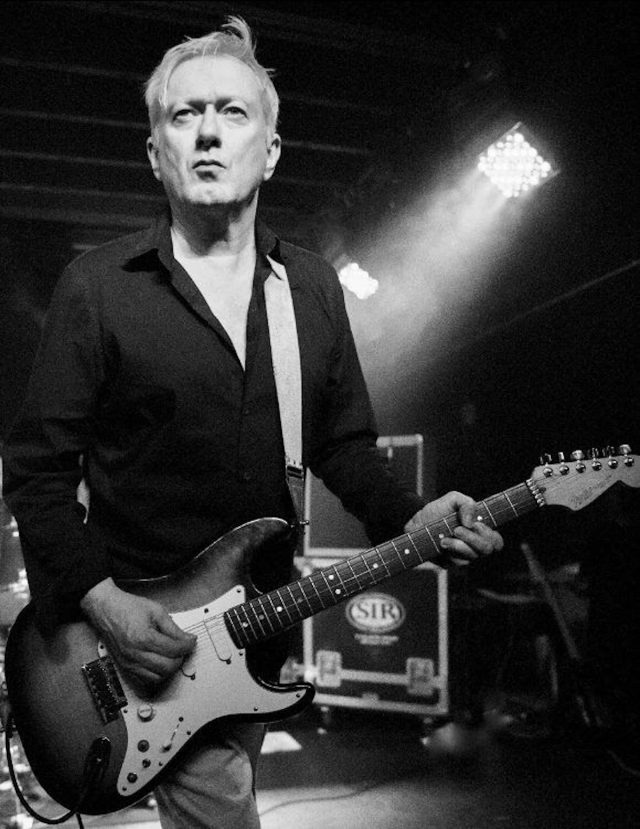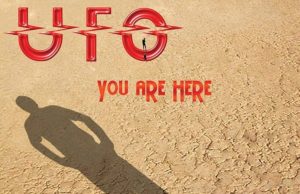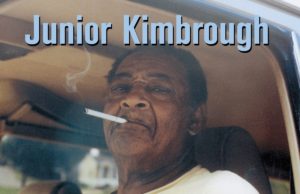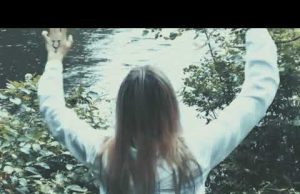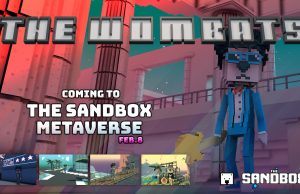The world is a little quieter and far worse off today: Gang of Four’s Andy Gill has died. The influential and iconic guitarist passed away in a London hospital today at age 64 following a short respiratory illness, according to an official statement from the band:
“This is so hard for us to write, but our great friend and Supreme Leader has died today,” wrote singer John Sterry, bassist Thomas McNeice and drummer Tobias Humble. “Andy’s final tour in November was the only way he was ever really going to bow out; with a Stratocaster around his neck, screaming with feedback and deafening the front row. His uncompromising artistic vision and commitment to the cause, meant that he was still listening to mixes for the upcoming record and planning the next tour from his hospital bed. But to us, he was our friend – and we’ll remember him for his kindness and generosity, his fearsome intelligence, bad jokes, mad stories and endless cups of Darjeeling tea. He just so happened to be a bit of a genius too. One of the best to ever do it, his influence on guitar music and the creative process was inspiring for us all, as well as everyone who worked alongside him and listened to his music. And his albums and production work speak for themselves. Go give ‘em a spin for him…”
I was fortunate enough to speak to Gill back in 2011, when the legendary post-punk band were touring Canada behind their comeback album Content. Here’s how it went:
The Gang of Four’s cultural revolution might not have been televised. But it certainly has been monetized.
More than three decades ago, the left-leaning British foursome helped pioneer post-punk with their fusion of funky grooves and spiky guitars, only to end up watching generations of followers — from Red Hot Chili Peppers and INXS to Franz Ferdinand and Bloc Party — ride their bandwagon all the way to the bank. But are they resentful? Well, maybe a little.
“I bumped into Flea from the Chili Peppers about a year ago at some party,” explains Go4 guitarist Andy Gill, who produced the Californicators’ eponymous 1984 debut disc. “We were talking and at one point he said, ‘Andy, I don’t know why you never sued the Chili Peppers. And we laughed — though I laughed a bitter kind of laughter, shall we say.”
But these days, Gill and his bandmates are having the last laugh. The reinvigorated band just released the deservedly hailed album Content, their first studio disc of new material in 16 years. Their propulsive classic Natural’s Not in It (from their essential 1979 debut album Entertainment!) has resurfaced in Xbox Kinect ads. And Gill admits that the Fleas and Ferdinands of the world deserve a little credit for all that.
“We certainly have to thank them in a way, because they have brought us a younger audience. When we first got back together, I didn’t really know who was going to turn up to see us, but the audience was pretty young. More than half of them were under 25. And I feel that’s partly because a lot of hip new bands introduced this young audience to us.”
Gill and his mates intend to cement the relationship on their latest North American tour. But first, the producer and performer filled me in on making a big noise, adhering to first principles and solving the problem of leisure.
What was your initial impetus for getting back together?
Well, for a while, there’d been phone calls going back and forth between us. But there are always plenty of reasons not to do anything. What actually happened was that I mentioned to my manager in 2004 that the idea of us doing something together keeps coming up. As soon as I said that he was on the phone and booking flights, and suddenly we found ourselves in a rehearsal room. It was interesting, because obviously it had been a long time. But this big noise came out and it felt like being reintroduced to these cool songs. The songs felt like we had just written them. It felt very fresh. It was exciting. So we started playing live and doing a lot of festivals.
Why did it take this long to get around to a new album?
At some point in 2006 or 2007, we decided it would be better if we had some new songs to throw in live. But it took a while to get around to it. It wasn’t a quick process. Jon (King) and I would write a couple of songs and then I’d go and produce some other band for a couple of months, and by the time I came back I’d be scratching my head going, ‘What was this about?’ Eventually, it became obvious the record wouldn’t get going unless I put aside a big chunk of time. So at the end of 2008, I decided not to do any other projects until our record was up and running.
After such a long time away, were you concerned about going up against your own past? It can be a no-win situation.
Exactly. If it sounds too much like the old stuff, it’s a nostalgia thing — you’re just repeating yourself. And if it doesn’t sound anything like it, people are confused. I think you have to forget it all and start with a blank slate. The things that excite me and get me going and make me want to write are the same as always. First and foremost, it’s about rhythm and groove and guitar. Those are the predominant things. And the thing Jon and I do is write songs where there’s often some sort of dialogue, with one character giving one point of view, while the other person is often a narrator, interpreting things for the audience. That’s how we love to tell a story. So it was all going back to first principles and thinking: What is Gang of Four about? But Jon and I didn’t talk very much about it. It was pretty instinctive. We’ve been doing this for a long time and we know where we’ve gone wrong in the past. So we knew what we had to do: Keep it simple and exciting.
Given the Marxist nature of some of your lyrics, people find it ironic your music is being used in ads. Is that something you embrace or a necessary evil in today’s music business?
I very happily embrace it. Having Natural’s Not in It on the Xbox commercial, for example, is a fantastic scenario. The only downside is that you don’t hear the first couple of lines of lyrics — ‘The problem of leisure / What to do for pleasure.’ If they’d been a bit smarter, they’d have had those lines it it. But from the word go, Gang of Four has been about reaching a bigger audience. Our music has a left-field, analytical approach to things, combined with a love of pure pop. It’s the collision of those things that we’re all about. But our music has never been outright commercial or thought to be easily consumable. So yeah, you need all the help you can to get it in front of people.
What’s the long-term plan? Is Gang of Four your first priority now?
Yeah. My intention is that we fairly quickly get on with the next record. It’s been exciting being in that creative flow, so it’s something that I want to carry on doing as soon as possible. So I think there’s more to come.













